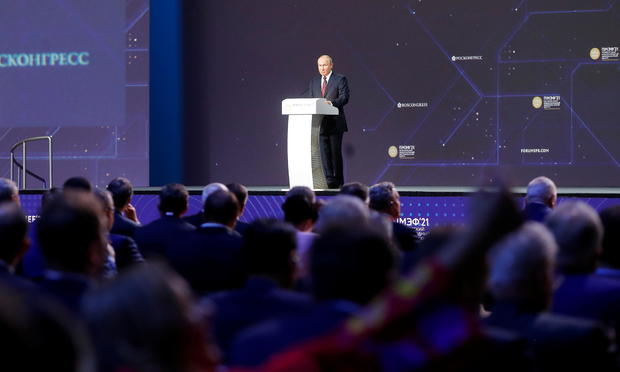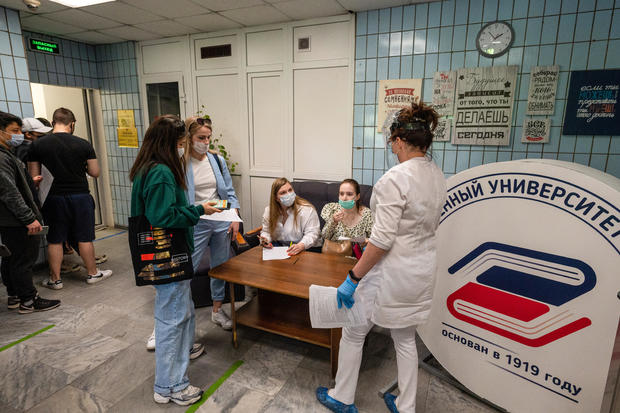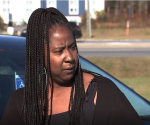COVID cases spiking in Russia as many continue to shun vaccine
[ad_1]
Moscow — Speaking last week at an economic forum that brought thousands of people to an expo center in St. Petersburg, President Vladimir Putin said Russia had handled the coronavirus pandemic better than most other countries.
“Half of the world is sitting at home,” Putin said, addressing a crowd of mostly mask-less officials. “Our situation is better than in many other countries.”
Putin cautioned, however, that “the pandemic is not over.” The most recent government data make that very clear.
Dmitri Lovetsky/Pool/REUTERS
Russia’s infection rates have been on the rise for weeks, while the vaccine rollout remains painfully slow. On Wednesday, the country’s coronavirus task force reported over 10,000 new cases of COVID-19 – the highest number since March and on par with the daily numbers reported during the country’s second wave last fall.
Authorities in Moscow, which accounts for more than 4,000 of the daily caseload, have blamed the new rise in infections, deaths, and hospitalizations on residents, and promised to increase enforcement of mask-wearing in shopping malls and cafes.
“Throughout this week, we’ve been recording an increase in coronavirus morbidity rates… epidemiologists link the increase in the number of infections to failure to abide by sanitary and epidemiological measures,” Moscow Deputy Mayor for Social Policy Anastasia Rakova said.
“The mayor has already announced today that no restrictive measures, especially lockdowns, will be imposed,” Rakova said. “In these conditions, the main burden falls on the medical staff.”
Dmitry Serebryakov/TASS/Reuters
Across Russia, few places enforce strict mask-wearing, and most businesses have returned to their normal mode of operations.
Russian authorities have resisted imposing new lockdowns after several weeks of strict measures last spring took a serious toll on the country’s economy. Officials have said they’re relying instead on at least 60% of the adult population getting vaccinated by the end of the summer to curb the pandemic.
But while the U.S. is averaging about 1 million vaccinations every day, vaccine hesitancy still reigns in Russia. Only about 12% of the overall population has received at least a first dose of a COVID-19 vaccine thus far, compared to more than half of the U.S. populace.
Russia registered its first coronavirus vaccine, Sputnik V, in August 2020, before there was even data available from Phase 3 clinical trials as is required in the U.S. and Europe. Over the past six months, Russia’s largest cities have been offering vaccines to virtually anyone willing to get the shot, but daily rates remain in the thousands rather than the hundreds of thousands.
The most earnest admission of Russia’s struggle to successfully vaccinate its people came from Moscow Mayor Sergey Sobyanin, who complained at the end of May that an “astonishing” number of Russians were refusing to be vaccinated against the coronavirus, despite continued illnesses and deaths.
“We continue getting sick, people keep dying, but they don’t want to get vaccinated,” he said at the time, adding that “the percentage of those vaccinated in Moscow is lower than in any European city.”
The mayor also pointed out that Moscow was the first world capital to launch a mass-vaccination campaign, but that of its roughly 12 million residents, only 1.3 million had actually had a shot.
Critics have attributed the Russian public’s apparent dismissal of the deadly pandemic to a poor information campaign by the authorities, and a lack of transparency in its vaccine approval process.
“People in focus groups said they are concerned by how fast Russia developed the vaccine, as well as the vaccine race among countries, at the expense of the thoroughness of clinical trials,” Denis Volkov, a sociologist with the independent Levada Center, wrote in an analysis for the Proekt website. “The problem is aggravated by the fact that the authorities have so far failed to send a single, clear and unambiguous signal to society that coronavirus is a dangerous disease and it is necessary to be vaccinated.”
Recent polling by the Levada Center has shown consistently that a majority of Russians say they’re not afraid of falling sick with COVID-19, and they’re also not ready to get a shot of Russia’s homegrown Sputnik V vaccine.
[ad_2]
Source link












